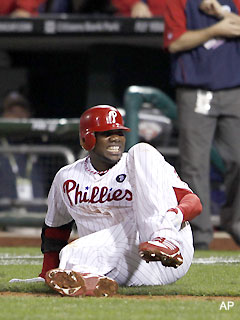Aaron Kim ’15 and Will Ruggiero ’15
The Phillies’ season ended October 7 to the underdog St. Louis Cardinals three games to two in the NLDS. The World Series favorites could not find a clutch hit in the last two games and the offense was shut down after an eleven run explosion in game one.

After last year’s loss to the San Francisco Giants in the World Series, the Phillies made a move that shocked the baseball world. By stealing Cliff Lee out from under the New York Yankee’s and Texas Rangers’ noses, the Phillies had assembled a pitching staff for the ages. With their four aces, Roy Halladay, Cole Hamels, Roy Oswalt, and Cliff Lee, the Phillies looked unbeatable. While their pitching lineup created an incredible defense, the Phillies overlooked the main reason they were eliminated from the playoffs in 2010: offense. No matter how good their defensive lineup was, their inconsistent hitting eventually led to their demise.

The 2011 season got off to a great start. On opening day, John Mayberry Jr. had a walk-off single that would only be the beginning for a great season. The pitching was as good as advertised with Halladay winning 19 games, Lee winning 17, and Hamels winning 14. Rookie Vance Worley even won 11 games for the team. The offense was good at times, but was wildly inconsistent and often had to be bailed out by the great pitching. Because of their offensive struggles, the Phillies made another big trade. On July 29, two days before the trade deadline, the Phillies acquired right fielder Hunter Pence from the Houston Astros for prospects. In the last two months of the season he played incredibly for the Phils, hitting over .300 and hitting twelve home runs.
The games before the playoffs were not a good sign for the Phillies. After clinching their fifth straight National League East division title, they went on to lose eight games in a row, in which their offense almost completely disappeared. Despite this losing streak, they won their last four games including a three game sweep of the Atlanta Braves that eliminated the Braves from being in the playoffs. The sweep of the Braves allowed the St. Louis Cardinals, who were nine games back of the Braves at the start of September, to win the league’s wild card. The Phillies ended the season with 102 wins, a team record, and 60 losses, which was the best record in baseball.


The NLDS started great for the Phillies. They won game one 11-6 with the help of an amazing eight innings by Halladay and Ryan Howard’s three run home run. Game two, though, was a different story. The Phillies jumped all over the Cardinals in the first two innings and found themselves up 4-0. With Cliff Lee, an exceptional postseason performer, on the mound, it looked as if the Phillies were going to win the game easily. This was not the case, however, as the Cardinals caught up, leading to a 5-4 loss for the Phillies. Game three was a pitchers’ duel between Cole Hamels and Jamie Garcia. No runs were scored until the seventh inning when Ben Francisco hit a three run home run to give the Phillies a 3-0 lead. The bullpen hung on to Francisco’s lead and the Phillies won the game 3-2. In game four, the Phillies struck first with two first inning runs, but the offense was unable to continue their momentum and they lost 5-2. The series headed back to Philadelphia for a pivotal game five.
In game five, the Halladay started pitching for the Phillies. The Cardinals scored the game’s first and only run in the top of the first inning. The Cardinal’s pitcher, Carpenter, was very skilful, holding the Phillies to four hits and walking no one. On the game’s final play, Ryan Howard hit a weak groundball to second and collapsed as he was running to first base. An MRI revealed that he had torn his Achille’s tendon.To many, the season ended in the worst possible way, leaving the Phillies in disbelief. Hunter Pence said that, “He felt sick to his stomach”. Halladay just sat on a chair with a look of shock on his face.
The Phillies will face many difficult decisions during this offseason, such as who to keep on the team and who to let go. One thing is for sure though; for the Phillies to be able compete for the World Series next season, they will need to create a stronger and more consistent offense than they did this year.
The Phillies 2012 season starts Monday, April 2, against the Pittsburgh Pirates.